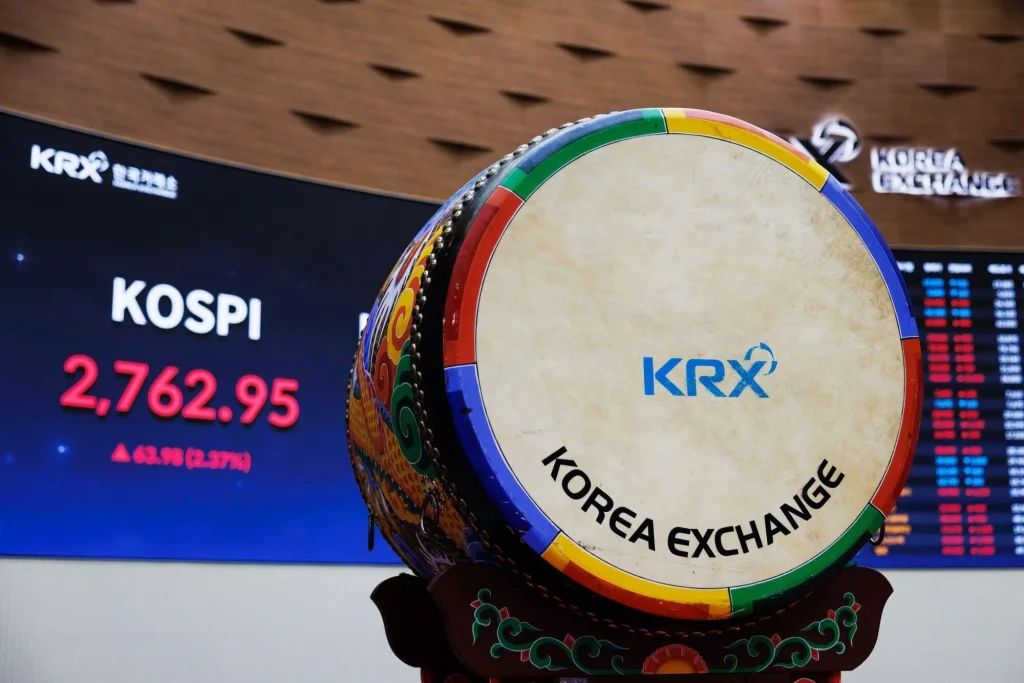[SEOUL] South Korea’s equity benchmark climbed to enter a bull market, after Lee Jae-myung’s widely-expected win in the presidential election ended a months-long political leadership vacuum.
The Kospi Index ended 2.7 per cent higher on Wednesday (Jun 4), taking its gain from the April low to more than 20 per cent as investors piled into potential beneficiaries of Lee’s reform and growth agenda. Holding companies, financial firms and brokerage stocks charged the Kospi higher on anticipation that Lee would seek to implement a key legislative change as early as this month that aims to boost shareholder returns.
The won rose 0.7 per cent against the US dollar, extending its rally into a second trading session. Korean government bonds underperformed with the 10-year yield rising about ten basis points – while the bond futures of the same tenor dropped to the lowest since January – reflecting concerns about more supply due to the new administration’s likely expansionary fiscal policy.
The election outcome removes one of the biggest overhangs impacting the local market – how the country proceeds politically after former President Yoon Suk-yeol’s brief imposition of martial law last year, which led to his ouster and Tuesday’s snap election.
Market focus now turns to Lee’s policies aimed at shoring up growth, centreed on more government spending, improved corporate governance and stronger labour protections, as well as wrapping up ongoing tariff negotiations and currency talks with the Trump administration.
Korea’s economy contracted in the first quarter, underscoring its weakness even before US President Donald Trump’s announcement of tariff hikes in early April.
BT in your inbox

Start and end each day with the latest news stories and analyses delivered straight to your inbox.
But the post-election rally was a sign that investors are anticipating a longer-term structural rebound in the market, Han Sang-kyoon, chief investment officer at Quad Investment Management, said.
“For the first time in history, we have a president who promised to strengthen the corporate boards’ fiduciary duty to shareholders,” he said. “This is very positive because it would resolve what the market sees as the biggest cause of the Korea discount.”
Despite political uncertainties and a sluggish economy, Korean stocks and the won have shown resilience this year, outperforming most of their Asian peers. The won got support after Yoon was removed in April, and it’s one of Asia’s best performers.
The Kospi is up 15 per cent so far this year, reflecting investors’ scouring for value after it dipped into a bear market earlier this year on concerns over US tariffs. The rally has extended across different sectors, with more stocks hitting their 52-week high late last month than at any point in recent years.
On the campaign trail, Lee stated his target for Kospi was to reach the 5,000 level, a sharp jump from the current level, and vowed to end the “Korea discount.”
Lee’s emphasis on corporate reform “would pave a path for valuation re-rating,” Han said, predicting that legislative changes that target increasing dividends and shareholder returns could push the Kospi above the 4,000 level.
The sectors linked to his policies made notable moves Wednesday. Shares of brokers, such as Korea Investment Holdings, jumped as investors bet on Lee’s pledges to lift stocks. Shares of holding companies, which control Korea’s conglomerates, also spiked on expectations that Lee’s reform agenda would spur more dividend payouts and share buybacks. They have been the poster child of the Korean discount as their market valuations are often less than the combined value of the stakes they hold in their subsidiaries.
Unlike his predecessor, Lee will have the National Assembly in his corner. His party’s control of the unicameral legislature may accelerate the implementation of election pledges, Jin-Wook Kim, an economist at Citigroup, said.
Still, the bond market move was a reminder that investors are keeping tabs on potential risks, including possibly more debt. Relatively strict labour regulations and direct debt relief for small businesses also could be on the horizon that may cloud the outlook, Kim said. BLOOMBERG


